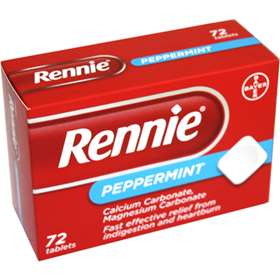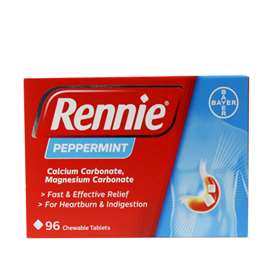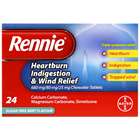What is heartburn?
Heartburn is an unpleasant condition that occurs when acid from the stomach rises up into the oesophagus and the throat where it causes a burning pain. This action is called acid reflux.The pain of heartburn can last for several hours or more and is often made worse by eating. Many people suffer sleepless nights as a result of heartburn because lying down can trigger the condition and increase the pain.
Affecting 25-30% of UK adults, heartburn is becoming more common, possibly as a result of increased stress, unhealthy diets and over-eating. Heartburn is particularly common during pregnancy with more than 72% of pregnant women suffering during their last trimester.
What are the symptoms?The main symptoms of heartburn are characterised by:
- Burning pain in the chest after eating.
- Burning sensation in the throat.
- Hot, sour or salty tasting fluid in the back of the throat.
Causes and preventions:
The causes of heartburn and indigestion are very similar. By avoiding the following activities it is possible to reduce your chances of suffering from the symptoms of heartburn:
- Eating too much or too quickly.
- Gulping down fizzy drinks and rich spicy food.
- Drinking too much alcohol.
- Irregular eating patterns.
- Stress.
What is indigestion?
Indigestion, also known as dyspepsia, is a general term for the pain or discomfort you feel in your stomach and under your ribs, usually after eating (although you can experience similar symptoms on an empty stomach).
Indigestion can strike at any time and there are many different causes, from rich food and fizzy drinks to stress and eating on the run. Some people get indigestion a couple of times a year but others suffer every day with symptoms ranging from mild discomfort that lasts just a few minutes to severe pain, sometimes accompanied by nausea and vomiting, that goes on for several hours.
What are the symptoms?
Indigestion affects different people in different ways, from the bloated feeling of mild indigestion to more severe symptoms such as nausea and vomiting.
The most common indigestion symptoms are:
- Pain or discomfort in the stomach and under the ribs.
- Rumbling or gurgling noises in the stomach.
- Feeling bloated or uncomfortably full after eating.
- A clenched or knotted feeling in the stomach.
- Excessive burping or flatulence.
- Stomach cramps.
- Nausea or vomiting.
- Trapped wind.
Causes and preventions:
You're more likely to suffer from indigestion if you have a busy, stressful lifestyle, if you smoke, you're overweight or if you don't exercise regularly. Indigestion can also strike on holiday when it's tempting to over-indulge in rich or spicy food and drink more alcohol than usual. Here are some of the common causes of indigestion, by avoiding these activities it is possible to reduce your chances of suffering from the symptoms of indigestion.
- Eating too much or too quickly.
- Gulping down fizzy drinks.
- Eating rich or spicy food.
- Drinking too much alcohol.
- Irregular eating patterns.
- Stress.
What is trapped wind?
Trapped wind is a common condition that causes pain or discomfort, usually as a result of pressure in your stomach or abdomen which makes you feel bloated and wanting to pass wind.
Trapped wind in your abdomen can be caused by excess swallowed air moving from the stomach into the intestines where it can make you feel bloated until the air is released as flatulence. If you wear clothes that fit tightly around your waist this will increase the pressure on your abdomen and make you even more uncomfortable. Another cause of abdominal bloating is gas produced by bacteria in your colon as they break down the residue from the small intestine. Most of this gas is absorbed into your blood stream, the rest is released as flatulence.
What are the symptoms?
Virtually everyone suffers from trapped wind at some point in their lives but many people are too embarrassed to admit it, mainly because the symptoms include bloating, gurgling noises and flatulence. The most common symptoms of trapped wind are:
- A bloated stomach or abdomen.
- Feeling uncomfortably full after eating.
- Rumbling or gurgling noises in your stomach or abdomen.
- Flatulence.
Causes and preventions:
Trapped wind can be triggered by a number of different things, from eating too quickly to wearing clothes that fit tightly around the waist. Here are some of the common causes of trapped wind. By avoiding these activities it is possible to reduce your chances of suffering from the symptoms of trapped wind.
- Eating too quickly or eating on the move.
- Gulping down drinks.
- Drinking a lot of liquid with a meal.
- Feeling tense or under stress.
- Chewing gum.
- Smoking.
Is there really a difference between indigestion and heartburn?
Although people often use the terms interchangeably, there is a difference between heartburn and indigestion.
Heartburn is an unpleasant condition that occurs when acid from the stomach leaks into the oesophagus and rises upwards to cause pain and discomfort in the chest.
Indigestion is a general term for pain or discomfort felt in the stomach and under the ribs. It is often triggered by eating or drinking things that make the stomach produce large amounts of acid e.g. spicy foods or alcohol.







.jpg)



















